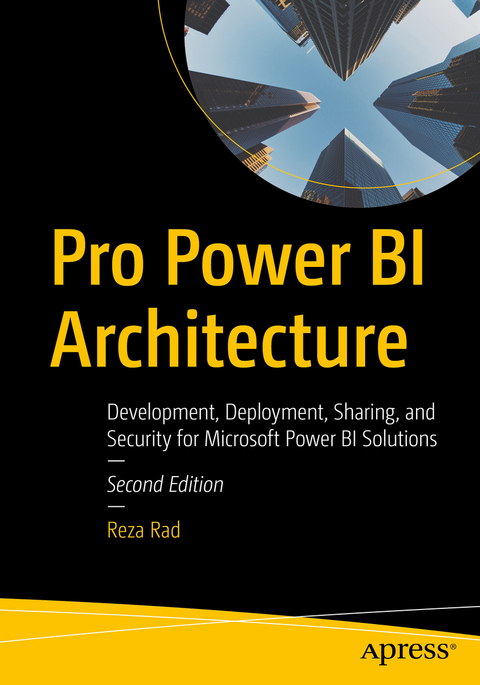
Pro Power BI Architecture
Apress (Verlag)
978-1-4842-9537-3 (ISBN)
You will gain an understanding of what functionality each of the Power BI components provide (such as Dataflow, Shared Dataset, Datamart, thin reports, and paginated reports), so that you can make an informed decision about what components to use in your solution. You will get to know the pros and cons of each component, and how they all work together within the larger Power BI architecture.
Commonly encountered problems you will learn to handle include content unexpectedly changing while users are in the process of creating reports and building analyses, methods of sharing analyses that don’t cover all the requirements of your business or organization, and inconsistent security models. Detailed examples help you to understand and choose from among the different methods available for sharing and securing Power BI content so that only intended recipients can see it.
The knowledge provided in this book will allow you to choose an architecture and deployment model that suits the needs of your organization. It will also help ensure that you do not spend your time maintaining your solution, but on using it for its intended purpose: gaining business value from mining and analyzing your organization’s data.
What You Will Learn
Architect Power BI solutions that are reliable and easy to maintain
Create development templates and structures in support of reusability
Set up and configure the Power BI gateway as a bridge between on-premises data sourcesand the Power BI cloud service
Select a suitable connection type—Live Connection, DirectQuery, Scheduled Refresh, or Composite Model—for your use case
Choose the right sharing method for how you are using Power BI in your organization
Create and manage environments for development, testing, and production
Secure your data using row-level and object-level security
Save money by choosing the right licensing plan
Who This Book Is For
Data analysts and developers who are building reporting solutions around Power BI, as well as architects and managers who are responsible for the big picture of how Power BI meshes with an organization’s other systems, including database and data warehouse systems.
Reza Rad is a Microsoft Regional Director, an Author, Trainer, Speaker, and Consultant. He has a BSc in Computer engineering and has more than 20 years of experience in data analysis, BI, databases, programming, and development mostly on Microsoft technologies. He has been a Microsoft Data Platform MVP for 12 continuous years (from 2011-present) for his dedication to Microsoft BI. Reza is an active blogger and co-founder of RADACAD. Reza is also co-founder and co-organizer of the Difinity conference in New Zealand, the Power BI Summit (the biggest Power BI conference), and Data Insight Summit (Chicago, USA). His articles on different aspects of technologies, especially on BI, can be found on his blog, which you can find at radacad-dot-com/blog. He has written books on Microsoft BI and also is currently writing others. He has also been an active member on online technical forums such as MSDN and Experts-Exchange, and was a moderator of MSDN SQLServer forums, and is an MCP, MCSE, and MCITP of BI. He is the leader of the New Zealand Business Intelligence users group. He is also the author of very popular book Power BI from Rookie to Rock Star, which is free with more than 1700 pages of content. He is an International Speaker in Microsoft Ignite, Microsoft Business Applications Summit, Data Insight Summit, PASS Summit, SQL Saturday and user groups. And He is a Microsoft Certified Trainer.
Part I. Getting Started.- 1. Power BI Ecosystem and Components.- 2. Tools and Preparation.- Part II. Development.- 3. Import Data or Schedule Refresh.- 4. DirectQuery.- 5. Live Connection.- 6. Composite Mode.- 7. DirectQuery to Power BI Dataset - 8. Choosing the Right Connection Type.- 9. Dataflows.- 10. Shared Datasets.- 11. Datamart.– 12. Multi-Developer Architecture.- 11. Hybrid Architecture using other Microsoft Services.- 12. DirectQuery to Power BI Dataset.- 13. Dataflow vs Dataset vs Datamart.- 14. Paginated Reports.- 15. Analyze in Excel.- 15. Development Tools.- 16. Real-time with Power BI.- 17. Aggregation.- 18. Incremental refresh and Hybrid tables.- 19- Power BI Development Best Practices.- Part III. Deployment and Collaboration.- 20. Power BI service objects.- 21. Power BI report server.-22. Gateway and configurations.- 23. Licensing guide (and PPU).- 24. Tenant settings.- 25. PowerShell Cmdlets for Power BI.- 26. REST API for Deployment and Administrations + .NET SDK.- -27. Audit Log for the Tenant.- 28. XMLA endpoint.- 29. Power BI Sharing Individual Objects.- 30. Workspace Sharing.- 31. Power BI App.- 32. Publish to Web.- 33. Power BI Embedded.- 34. Secure Embed.- 35. Embed in SharePoint online and Teams.- 36. Compare sharing methods.- 37. Different types of Users in Power BI.- 38. Workspace Roles.- 39. Build Access Level.- 40. Workspace Structure and Architecture.- 41. Content Certification and Governance.- 42. Deployment pipelines.- 43. RLS and Dynamic RLS and OLS.- 44. Power BI Helper.
| Erscheinungsdatum | 27.07.2023 |
|---|---|
| Zusatzinfo | 810 Illustrations, color; 11 Illustrations, black and white; XXXVI, 757 p. 821 illus., 810 illus. in color. |
| Verlagsort | Berkley |
| Sprache | englisch |
| Maße | 178 x 254 mm |
| Themenwelt | Mathematik / Informatik ► Informatik ► Datenbanken |
| Mathematik / Informatik ► Informatik ► Software Entwicklung | |
| Schlagworte | Azure Event Hub • Azure Stream Analytics • Dataflow Architecture • DAX • Deployment Pipelines • DirectQuery • Governance • Live Connection • Paginated Reports • Power BI Architecture • Power BI Dashboard • Power BI Desktop • Power BI Gateway • Power BI Report Server • Power BI Sharing • Power BI Templates • Row-Level Security • Scheduled Refresh |
| ISBN-10 | 1-4842-9537-4 / 1484295374 |
| ISBN-13 | 978-1-4842-9537-3 / 9781484295373 |
| Zustand | Neuware |
| Informationen gemäß Produktsicherheitsverordnung (GPSR) | |
| Haben Sie eine Frage zum Produkt? |
aus dem Bereich


